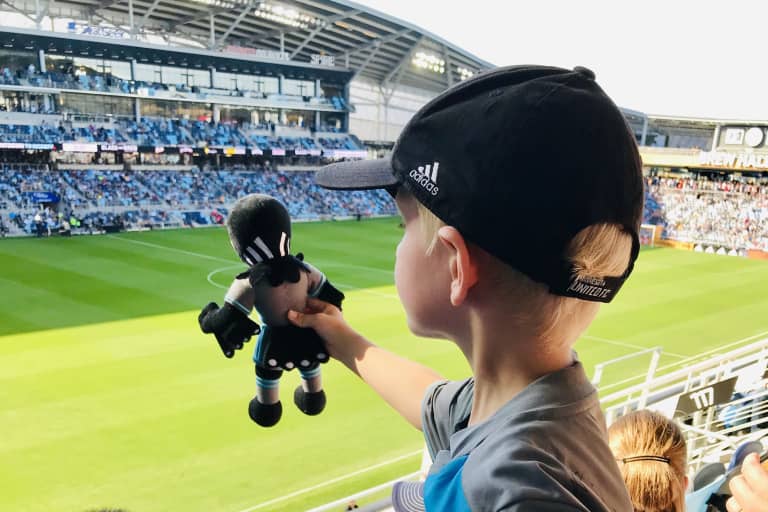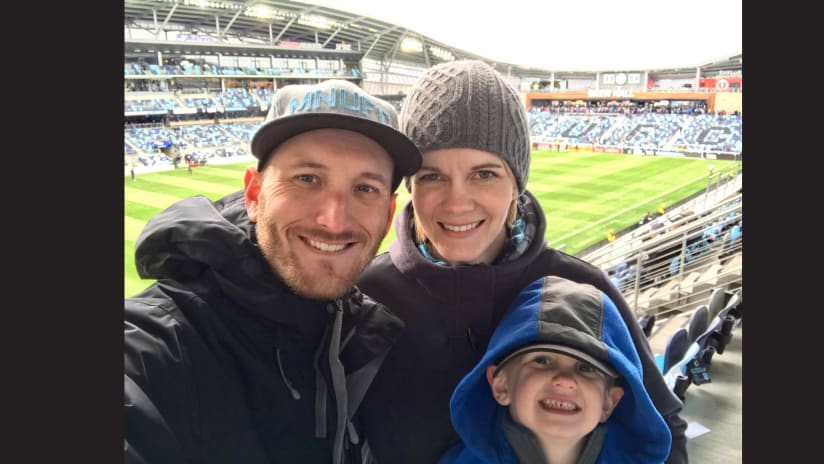The COVID-19 pandemic has upended lives for people across the world, across the United States and across Minnesota. From workers being furloughed to parents homeschooling their children to essential workers who keep doing their jobs day in and day out, everyone has had to adapt and adjust. Here at MNUFC, we wanted to bring you the story of some season ticket members and how their everyday lives have been affected.
For now, Luke and Corrine Owens and their six-year-old son Jack wake up in different places every day. Corrine is an occupational therapist and the Director of Rehabilitation at a nursing home and long-term rehabilitation facility in Saint Paul that had its first positive COVID-19 test at the end of March. The family made the difficult decision on March 30 to send their son to live with his grandparents in Eau Claire, Wisconsin, while Corrine isolated herself in their house, away from Luke, who works as the Clinical Director of a community mental health clinic.
The Owens, who have been season ticket members since 2017, went to their first soccer game up at the National Sports Center in 2016 — almost by happenstance.
“I had a coworker from where I work now who invited me to a game up in Blaine,” said Corrine. “I knew my husband was into soccer and it sounded fun – I mean, I didn’t play or anything – so, we took her up on the offer and that’s kind of where it all started. We took our son with us, who was two or three at the time, and it was a blast.”
The family wandered from the bleachers over to the family area where they got to meet PK and hang out with other families. “And then, somebody saw him – a staff member – and brought him a signed ball,” said Luke. “Like, a little ball that said Minnesota United on it. And then some players after the game came by, and being that close to the game, I think, really drew his eye.”
Years later, Jack now sleeps with an MNUFC soccer pillow and PK plush stuffed animal every night. And although it’s been tough on him, his parents have been continually impressed with how he’s handled it. “It’s not easy. Jack is resilient, though,” said Corrine. “We talk to him via FaceTime every night to just see him and know what’s going on for him. But the thing that we’ve learned the most about him is he can just roll with the punches. And for a six-year-old, I think that’s pretty extraordinary.”
Corrine’s job has put her face to face with the pandemic and its effects, often quite literally. As the person in charge of rehab at her facility, her work is hands-on, and she and her co-workers have had to navigate the challenges of communicating with people who might be hard of hearing through facemasks and face shields. Many of those patients have also found that what they hoped would be short stays as they recovered from procedures or other illnesses have turned into extended periods away from friends and loved ones.
Corrine’s job has become in large part how to get them through this. “How to still make them better and still help them through rehab while this mysterious virus is coming through and they don’t get to have visitors anymore,” she said. “[Dealing with] those kinds of things that are really sad, but still being able to be a strength for people, not only on my team, the therapists that I work with, but also in the facility in general. Just helping to lead people through and not be scared.”
With Corrine isolated from Luke, Luke has worked to find the silver lining in the situation. He’s been in charge of meals, which he has to drop off at Corrine’s door, and he’s also been the one to visit Jack when it’s possible. “I actually see it as it’s good — being able to serve,” he said. “It not only focuses the mind, when it can certainly get disorganized around all of this stress and negativity of everything, but it gives me something to do to be solution-focused. To be oriented towards my family, serving them. It’s been a great honor. I think it’s been a huge strength and it’s been a source of unity and just joy.”
When it comes to their experiences in their jobs and their perspective on what everyone can do, they suggest a few things, from the logistical (“You can protect a lot of people by just you yourself wearing a mask”) to the empathetic (“Don’t forget about the people you love that maybe are in a nursing home — a card or a letter, those things can still get through”). In the end, though, it’s really about something that’s simple to say but often harder to do.
“Our need for connection and community remain needs through all of this,” said Luke. “I think that we also need to be kind. People matter, now more than ever. So, let’s be kind to one another.
“I also just want to tell people it’s okay to not be okay,” he added. “As therapists, as healthcare professionals, we’re often the ones that people come to when things are not okay. And now here we are, we are growing such an appreciation into our tank of empathy and [that] it’s okay to also reach out for support.”
Like everyone involved with Minnesota United, they’re missing the game. “My favorite memories of soccer in general are when Luke, Jack and I all have been able to go to Allianz Field, together,” said Corrine when asked what she misses. “And that’s always been very special. But I think just watching Jack cheer. He’ll do all the cheers with the Wonderwall. M-N-U-F-C, and he might not get it right, but he is definitely animated.”
When Jack heard about his parents getting interviewed, he got animated as well. Luke asked him what he wanted to say to everyone.
“I love you mom and dad,” he said. “Mom, you’re a superhero. Hello Loons. I’m at my grandma and bapa’s house. I hope you have a good day and stay healthy from the sickness. Okay, bye!”






